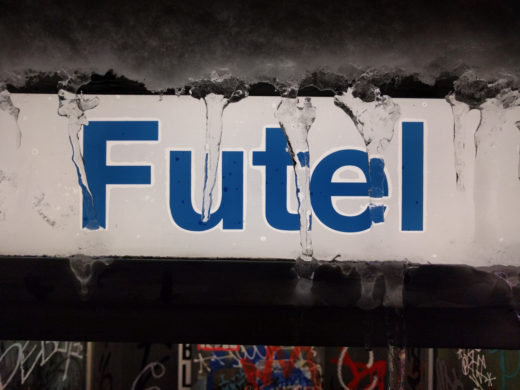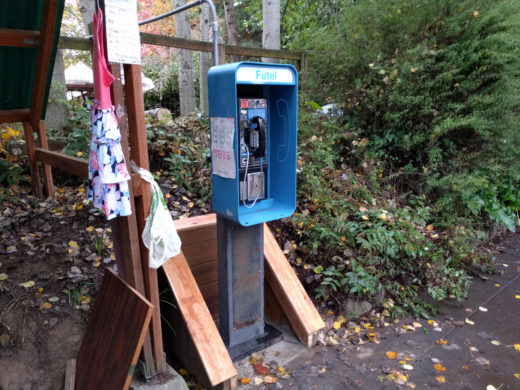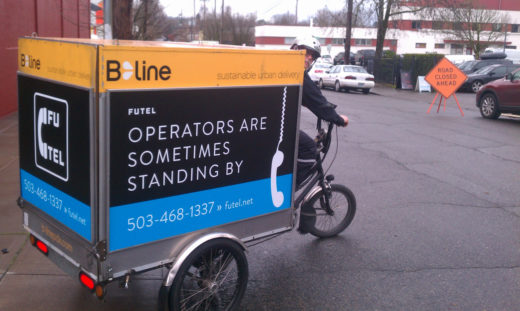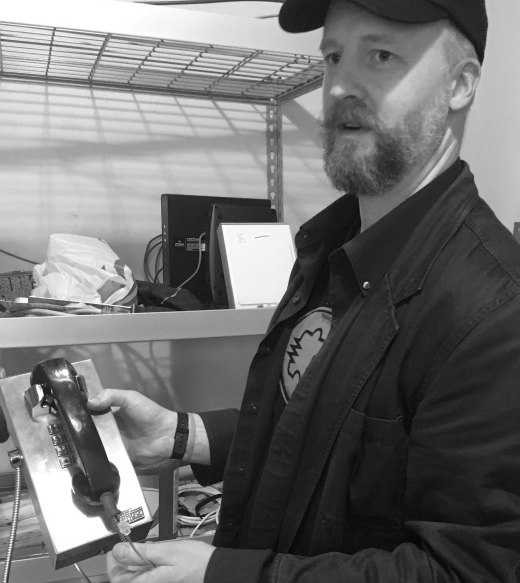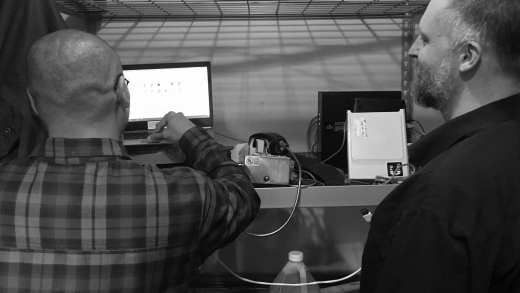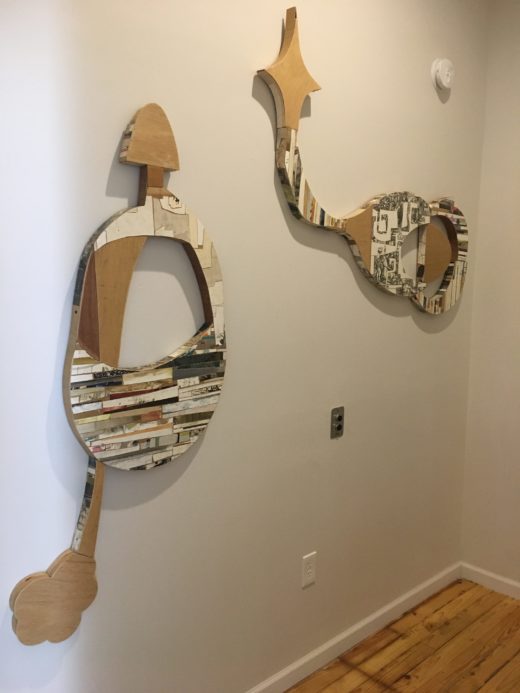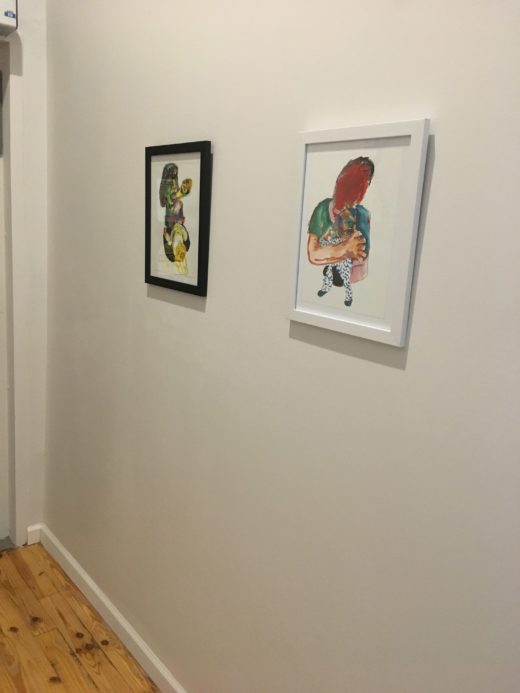Not too long ago, my friend Dug, knowing that I’d just purchased a former Michigan Bell Telephone building in Ypsilanti, put me in touch with a friend of his in Portland by the name of Karl Anderson. Karl, he told me, was looking for places to install “free payphones.” Well, late this last winter, Karl and I met in Ypsilanti to discuss the evolution of telephony, how a free phone might be implemented in Ypsi, and the goals of Futel, the entity which he’d launched to put phones back in the hands of people who need them. Following is a dramatic recreation of our discussion.
MARK: Before we talk about Futel, do I understand correctly that, like me, you spent some time in the highly-lucrative zine industry back in the ‘90s?
KARL: I started in the ‘80s, doing things on my mom’s office copier at night. I’d say I started making a zine that someone should actually read in the ‘90s, when I published C.H.V.N.K. 666, which was a zine about mutant bike culture in Portland. I didn’t have any software at first. I used LaTex.
MARK: So, how did you come to zines? When did you first realize that self-publishing was a thing?
KARL: For me, it started with gamer zines. In the ‘80s, there was a zine community based on play-by-mail games, like Diplomacy by Avalon Hill. I was hugely into tabletop games, role-playing games, and other nerdy things, and, while I never played Diplomacy, I came to know about it through friends. And it kind of drew me in… Diplomacy made a good correspondence game. It’s really abstract, and has a small number of pieces. I think the board is the entire WWII European theater but a turn can be written out similarly to chess notation, if I remember right. So there’s a lot of room in a letter for discussion, and art, and philosophy, and a community of zines kind of grew up around that, from round robin letters. And people would make spinoff zines that didn’t have anything to do with gaming. So, that’s what set me on that path. And, from there, I found small press comics zines. And then I moved on to mail art, which was his huge community of weirdos doing inscrutable, samizdat style art. Then, from there, I found a lot of weirdo politics and philosophers, 6 point 3rd generation copies. Then, of course, came Factsheet Five. And, at some point, I made a website around C.H.V.N.K. 666, a mutant bicycle club I started with some friends, back in 1992, and it became a zine.
MARK: And is it safe to say that the work you’ve done since still has an underground press component?
KARL: That’s true. I never stopped making zines. All of my projects seem to have a zine associated with them.
MARK: And it was through C.H.V.N.K. that you came to know our mutual friend Dug (Song)?
KARL: Yes. When I made the C.H.V.N.K. site, I started corresponding with Dug over email, and we traded zines for a couple of years. We kept in touch, and, when I found out he was getting Duo Security off the ground in Ann Arbor, I convinced him to hire me. And that’s why you can find me stumbling around Ann Arbor and Ypsilanti several times a year. So, yeah, I tell everyone to not just share their stuff on Facebook, but to make websites, zines, anything that lets you have control instead of hoping to please the marketing algorithm. I’m living proof.
MARK: OK, let’s talk about Futel. What’s the idea behind it?
KARL: I have a prepared statement which I think should fully explain everything.
At Futel, we believe in the preservation of public telephone hardware as a means of providing access to the agora for everybody, and toward that goal we are privileged to provide free domestic telephone calls, voicemail, and telephone-mediated services. We do not judge the motivations of our users, or who they choose to call; if they don’t have someone to call, we can provide a presence on the other end. Denial of telephony services has long been a tactic used against undesirable populations, and our devices will counteract that. But more importantly, we will help to establish a new era of communication, one in which reaching out is not only desirable, but mandatory.
To what extent are our interactions mediated by intelligent machines? Who is doing the talking when we let them decide who we interact with and what constitutes appropriate topics of communication? We believe that the time has come to greet each other not with our heads down, staring at our hands and begging for the permission of the minds that oversee our networks, but proudly, standing tall, with our eyes open and aware of our surroundings.
We are primarily driven by the basic needs that we see on the streets every day, by giving something away that is cheap for us but valuable to the recipient. But we hope that we can also build a tower of Babel on top of that, a monument of telephones and switching networks and cascading psychological structures which will give the community something else as well, something we may not appreciate until it has forever changed us.
MARK: And how did all of this come to you? Was there something specific that made you think, “It’s imperative, for all the reasons outlined above, that we bring public phones back”?
KARL: The original reason was mainly just that I like payphones. Public phones were part of the cyberpunk urban furniture that we didn’t expect to go away, and part of hacker history. I like street hardware, public keyboards, the whole thing. And then there was a guy who mowed my lawn, but he couldn’t always keep his phone paid up. He would push his mower around the neighborhood, but some days I wouldn’t be home, or I wouldn’t need my lawn mowed. I thought he might find it helpful if he had a phone and a voicemail account. And my street has a lot of foot traffic, there’s a light rail station down the block and a lot of tent encampments around. I thought it would be interesting to see how it would get used. I just repeated all those reasons to myself until I was convinced. It might not make the most sense, but other people have continued to contribute over the years, I use that as validation.
 MARK: Speaking of the history of hacking, were you ever in envolved in phone hacking, or phreaking?
MARK: Speaking of the history of hacking, were you ever in envolved in phone hacking, or phreaking?
KARL: Not me! I didn’t even get a modem until 1990, and, while I did visit some scummy BBSs, I was really just an outside observer when it came to that particular scene. I may or may not have enjoyed using a red box, though.
MARK: Where was your first install, and has the vision for Futel changed at all as a result of what you’ve experienced thus far?
KARL: The first Futel phone is in Portland, in front of my house. I expected it to get used, given the neighborhood I’m in, but I’ve been surprised by how much activity it gets. But, to your question, no, the vision remains pretty much the same. We’re both a social service organization and a public art project… I should add, however, that we realize all communities are different, and, for that reason, we want to allow flexibility when it comes to how the phones are configured. It depends on what the host might want, so long as the phones provide free calls.
MARK: I want to ask you more about those configuration options, but, first, I’m curious to know about the phone in front of your house… When people call the operator, are they talking with you, just a few feet away, perhaps watching them from behind a curtain?
KARL: No, I’m not creepily watching them through the window. I might be in the house they’re in front of, though. Or I might be somewhere else. Or another operator might get the call. Or I might be in the house, but they may be calling from a different Futel phone… Anyway, for general paranoid reasons, Futel operators never reveal their location, or their name, to callers. I have talked with Futel users in person before, though, if they happen to say hello to me while I’m around one of the phones.
MARK: So, speaking of operators, is scaling going to be difficult as you add more phones, and thus users to the system?
KARL: We have several operators, but we can always use more. I’d love to have more in other timezones. But, to answer your question, we don’t always get every call. If you don’t get an operator, though, you can always try again. Eventually someone will call you, if you stick around…. When an operator doesn’t pick up, you’re prompted to leave a message, and you can leave your voicemail box number, if you want a reply.
MARK: If someone out there happens to read this, and wants to find out about being an Futel operator, is there an online application or something? And can people sign up for limited shifts? Could someone, for instance, sign up for 9:00 to midnight EST the first Friday of every month?
KARL: We don’t currently have limited shifts, but operators don’t need to respond to every call. The system rings every operator, and, whoever wants to pick up the call just indicates their intention before being connected. As for prospective operators, they’re always welcome to apply. All they have to do is call an existing operator from any Futel phone! The handbook is currently only printed in issue one of Party Line, but we could set up an orientation conference call.
 MARK: Would I be right to assume that Party Line is the Futel company zine?
MARK: Would I be right to assume that Party Line is the Futel company zine?
KARL: Yes!
MARK: So it’s OK with you if not every operator call reaches an operator?
KARL: Our motto is, “Operators are sometimes standing by.”
MARK: Is that your only motto, or are there others?
KARL: We also have, “The Insecure Network For Insecure People,” and “Save Your Quarters For Robotron.”
MARK: And what kinds of things do people ask when they do reach an operator?
KARL: There are a lot of number lookups, mostly social service things, but a large variety. I helped one person find a dating chat number, he didn’t have the exact name, but he knew it was a local number. And we’re asked for addresses, directions, advice…
MARK: Can you give us an example of an advice call that you’ve fielded?
KARL: I’ve given career advice. And I’ve told kids to stay in school.
MARK: Are there any circumstances under which you might encourage a young person to leave school?
KARL: Active shooter? Fire? Seriously, if a caller had a heavy question, I’d help them figure out how to contact more qualified help. Stay in school, kids.
MARK: So, as I understand it, not only can I, as a Futel user, pick up a handset and talk with an operator, but I can also be connected to people who happen to be in the vicinity of other Futel units, assuming they feel like picking up and talking when the phone rings. Is that right? If someone here in Ypsi wanted to talk to someone, and didn’t have anyone to call, he or she could just pick up the handset and be connected to someone, say, walking by the phone in your front yard in Portland…
KARL: Yes, that feature is called the “payphone shotgun,” and it calls every public Futel phone, as well as every payphone with an incoming number that we know about. Speaking of which, we’re always looking for more payphones to add to the system, if people know of numbers.
MARK: How many Futel phones are currently online, and how many other, non-Futel payphones are connected through the “payphone shotgun”?
KARL: In the Futel network, we currently have three public phones, and one at Right To Dream Too, which is a tent encampment – “Houseless Rest Area” – in old town. It’s a block of tents, support structures, and tiny houses, part of the Village Coalition. I know about some non-Futel payphones, but not all of them allow for incoming calls. Those are hard to find! I just collected two when passing through Chicago Union Station last weekend. I only know of one payphone in Ann Arbor, and it’s in the lobby of the Embassy Hotel, behind a locked door.
MARK: Do you happen to know how many adults in our country, as a percentage of the population, don’t have access to cell phones, landlines, etc?
KARL: I have no idea, but I think you’d be surprised. A lot of Futel users look like people who you’d expect to have phones.
MARK: So, when you look out your window, and you see the folks using the Futel phone out front, they often look to you like people who you would expect would have phones…
KARL: I can’t always see the user, as there’s a bush that gives partial cover, but yes. I really don’t know who I expect to have a phone anymore. A phone is a useful tool, and a cell phone is the most sensible, or cheapest, or only, way for some people to have one. But I sometimes see users with shopping carts or bags of cans, and I sometimes see users with cars or cameras.
MARK: I know, having discussed it with you before, you’re sensitive to privacy, but I’m curious as to what you might have learned, looking at the aggregated data. Has there been anything that surprised you concerning usage?
KARL: I don’t track or aggregate anything, but I do check the logs to look for problems and see if our money is being spent faster than we expect it to be… I did once notice in the logs that someone was using the phone on winter mornings, the same time every morning, about 3:00 – 4:00 AM. Calls get cut off after 15 minutes (so we don’t pay for hours of call time if someone leaves the phone off the hook), so this person would talk for 15 minutes, then call again, once or twice a night, for half an hour or an hour. This was in the rain, and in the winter, so they were motivated.
MARK: I’m not sure what you mean by “money being spent.”
KARL: We are buying phone service and giving it away for free. Also computer time and other related expenses.
MARK: So, by “money being spent,” you’re referring to the bandwidth being consumed?
KARL: I’m referring to anything that we are paying for being consumed. For a single call, that’s mainly phone service minutes, but there are services that we buy or rent. We’re a shoestring operation, and I try to buy the cheapest level of service we can.The main expenses are phone service and cloud computer rental, which we pay for by the minute. Next is probably phone numbers and 911 service, but that’s a monthly cost.
MARK: Let’s talk about payphones. How many are still in existence, and what, in your opinion, has been the impact of society of their rapid disappearance?
KARL: All I know is that they’re disappearing, and the communications companies are trying to think up ideas on how to monetize that real estate, conceptual presence, and infrastructure, and they’re all stupid, immoral, or both. It’s a lot less fun without them. Cell phones and other pocket computers are of course useful, and not going away, but payphones still have an important place in our cities, and I don’t think our phones will look so strange in the future.
Oh, wait, I have a prepared statement for that, too.
What will Futel’s role be in the coming end times? As an organization whose core strategy is to glean discarded equipment on its way to the smelter and the toxic waste dump and turn it into installations which provide tools, information, and entropy to anyone who walks up to them, we are familiar with operating in the margins. Our users, also, tend to occupy several fringes of humanity, and we have seen them get erased from the city with each season.
Our position is a reminder that while local conditions may change radically, this day is not significantly more apocalyptic than any other we have experienced in our lifetimes. The devices we use and the specifics of how we encourage our users to use them will necessarily adapt, as will our message and attitude, but our mandate will not. We will establish a new era of communication, one in which reaching out is not only desirable, but mandatory.
Are we expending all of this effort only to see our payphones gleam in the rubble of the depopulated cities? Perhaps, but this was always a possible outcome. Are we jaded due to growing up in a decade when the imminent end of the world was promised to us weekly? Probably, but this outlook has allowed us to survive and do our work. Are our motives good and our results positive? Close enough.
MARK: What would a person hear upon lifting a Futel handset and putting it to his or her ear?
KARL: You can listen for yourself here.
MARK: That’s your voice, right?
KARL: Yes, but we do have facilities for having other people record menus, and some submenus have other people. We would like to set up menus in other languages.
MARK: OK, one of the choices is voicemail. Can people actually set up voicemail through Futel?
KARL: Yes, and voicemail can be left or checked from the incoming line. We would like to be able to give out numbers that would go directly to voicemail accounts someday – the caller wouldn’t know that you didn’t have a phone. On Futel, nobody knows you’re a CHUD.
MARK: Cannibalistic Humanoid Underground Dweller?
KARL: Yes!
MARK: OK, so there’s a reference to conference calls. What’s that all about?
KARL: It’s basically a party line.
MARK: And the “wildcard line”?
KARL: That is an audio zine, basically call and response. Users can contribute from any Futel phone. Currently, you can only hear it from the phone, although I plan to put them on the net when I get time.
MARK: So people are prompted to say something… tell a story, describe what’s happening where they are, etc… and your intention is to aggregate all of that into an audio zine that could, one day, be shared online, as well as through Futel phones.
KARL: Two episodes are already shared through the phone. I like to give phone users something special, so they get everything first. But you can hear at least one episode on the incoming line – 503 HOT 1337.
MARK: So, here in Ypsi, assuming we move forward, how much flexibility would we have in configuring our menu?
KARL: We will be making a custom menu for Ypsi. We really should get the mayor’s number in there, and relevant social services, whatever else you want. The only real constraint is that it’s a slow process right now to push changes.
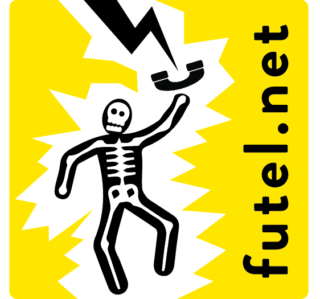 MARK: Can you give us an idea of the kinds of numbers you’re sharing on other Futel phones?
MARK: Can you give us an idea of the kinds of numbers you’re sharing on other Futel phones?
KARL: Besides the mayor, we have a directory of social service numbers and a directory of amusing numbers. The social service numbers are things like 211, a transportation service called Call To Safety, bus schedules, things like that. The amusing numbers include the Apology Line, which is one of our inspirations, it’s basically voicemail discussions as social art.
MARK: What about emergency calls? Is there any risk, given how the system is configured, that emergency calls may not go through? I mean this is all contingent on the wireless being operational and the internet being up, right? I’m just wondering if there’s any responsibility, when you place a public phone outside, to ensure that it connects… Is that something that you’ve thought about?
KARL: There is always risk, and there is great responsibility. If the power or net goes down, the phone goes down. All I can say is that reliability is the first priority, we monitor and notice when a phone isn’t connecting, and we test emergency calls with each release, and we’ve been more reliable than other payphones in the area. One user had to run over a mile and pass two non-working phones to use ours. One user had difficulties and got an operator to make a call. I do fear that someone will spend time someday trying to use a non-working Futel phone in an emergency. But I am certain that it is a net positive, the phones have been used to get emergency medical services at least twice.
MARK: Are there other areas of the country that you’d like to see Futel phones deployed?
KARL: Anywhere that gets public usage, although these days we want to get funded upfront before committing hardware, and someone local needs to be a point person.
MARK: What makes a community right for Futel? Are there certain demographic factors that you consider?
KARL: If we think there is a community that will use any aspect of a phone, it’s a good place. We’re supported by grants, so the ability to pay for everything is one factor. But if there are local stewards, we have low-cost options that are easier to start up.
MARK: I hear that you’ve got a grant being considered to roll out Futel payphones in multiple homeless encampments around Portland. Is that correct?
KARL: Yes! I don’t want to go into details until we know what happens there. But we will be putting some kind of service in several sites. If we don’t get this grant, we’ll just give them something less ambitious and figure out how to pay for it until we do get one.
MARK: OK, so the first time you were out here in Ypsi, we talked about putting a Futel phone outside the offices of Landline Creative Labs at 209 Pearl Street. And, since then, if I’m correct, you received an Ann Arbor Awesome Foundation grant to make it happen. Assuming that’s the case, what kind of timeline are we talking about? When might we see a Futel shell across from the Ypsi Transit Station?
KARL: I’m bringing IT hardware tomorrow, I like to bake it for a while and make sure it stays connected, then we just need to ship the outdoor hardware and have you connect it. I have everything, just need to refurb the enclosure and figure out how to ship it cheaply. Basically I’m relying on your expertise to install and maintain it. By the way, I hope to sneak an Ann Arbor phone installation in on the same grant. But that’s still to be determined.
[top: Futel’s Karl Anderson tests equipment at 209 Pearl Street in Ypsilanti the day after answering the above questions. bottom: Old friends Dug Song and Karl Anderson hack their way into the Landline Creative Labs communications backbone.]

